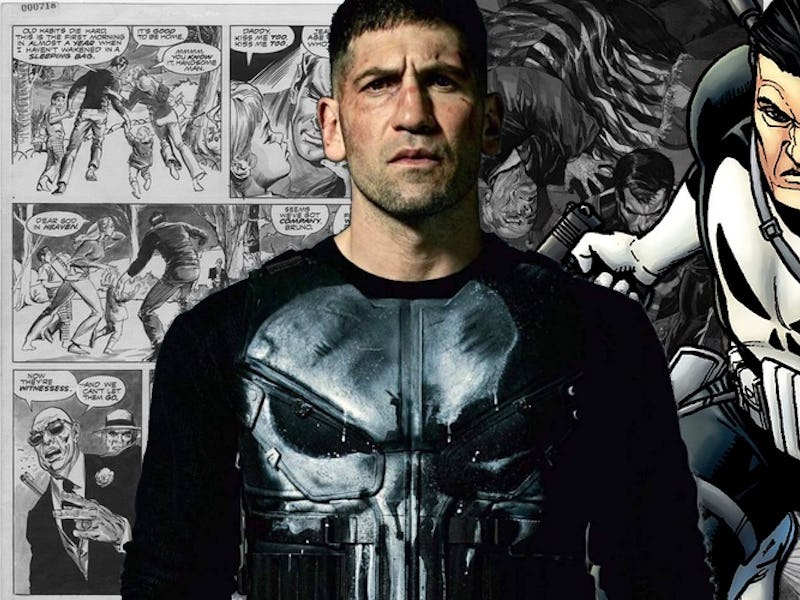Netflix's 'The Punisher' Totally Reboots His Marvel Origin Story
In 2017, Frank Castle has undergone a serious change.

As Marvel’s The Punisher heads to Netflix on November 17, it’s worth observing how much Frank Castle has evolved. On the surface, TV’s Jon Bernthal looks the same as Frank Castle does in the comics: Black clothes? Check. Leather trench? Check. White skull? Ammunition belts? Check, check. But behind the scary arsenal, and inside his actual skull, there lies a different Frank Castle than we’ve known since 1974. In short, the origin story of the character is now totally different from the comics.
Minor spoilers for Marvel’s The Punisher ahead.
In the old origin story, Frank Castle becomes the Punisher after his family is gunned down by the mob in cold blood. That origin, which was contextually informed by the crime waves of the ‘70s and ‘80s, remained set in stone for pretty much all cinematic Punishers. That includes the 2004 movie The Punisher, which for most millennials was their first introduction to the character (unless they had a generous uncle lend them long boxes of old comics).
But everything changed for Netflix. Though the Punisher’s origins were retained in Daredevil Season 2, The Punisher reveals that there was more to the death of the Castles thank Frank knows. As payback for Frank’s insubordination during a black ops missions that he found morally repugnant, the government — not the mob — orchestrated the deaths of his family.
In effect, the context to Frank Castle’s Marathon Man vigilantism has been rewritten. Rather than a gun nut who mows down crime, the Punisher is a one-man army whose red dot sights are aimed solely at the institutions that turned him into a public menace. Though the formula of his origins is still sound sound (tragedy + army veteran - family = The Punisher), it is significant the responsible parties aren’t ripoffs from Goodfellas, but the vast military-industrial complex.
Everything in Netflix’s The Punisher is painted with post-NSA, “truther”-hued strokes. Characters like Micro (Ebon Moss Bacharach), who has been rebooted from a basement tech expert into an exiled NSA analyst, enables The Punisher to tap into a timely flavor of surveillance and control, even if the show doesn’t have a serious comment towards Edward Snowden.
Jon Bernthal stars as Frank Castle on 'The Punisher.'
While “Punisher vs. the U.S. Army” is as implausible as anything in comics, it’s arguably a tighter story that also morphs Frank from a Second Amendment wet dream into a well-armed, well-trained David against a $600 billion dollar Goliath. But as a result, The Punisher poses interesting, if also confusing, questions about the character’s place in 2017.
On paper, the Punisher represents the worst path a superhero could take. This is why among so many other superheroes in the Marvel Universe, Frank has never been invited to join the Avengers. In the comics, Frank has been either a misguided patriot, or a man who has been twisted in confusion. We’ve seen Frank revere Captain America, and we’ve seen Captain America punch Frank in the face for being batshit crazy.
Yet Castle’s popularity, energized by comic readers and some political conservatives (his skull symbol was appropriated by Navy SEAL sniper Chris Kyle) has been, to say the least, baffling. Now that the Punisher’s killing spree are towards those who swore the same oaths he did, The Punisher compellingly paints Frank in an anti-patriotic light. It’s more interesting when you consider that veterans and policemen in real life revere the Punisher.
Frank has no allegiance to the system. The system killed his family. Now the system is chasing him up and down Hell’s Kitchen as an enemy of the state, not because Frank Castle has wrongfully made himself judge, jury, and executioner, but because Frank Castle knows too many secrets.
Captain America punches Frank Castle in 'Civil War' #6.
Has the Punisher finally become apolitical? For years there have been some debate regarding where in the political spectrum the Punisher resides. As a gun fetishist who believes in the death penalty, it’s not hard to put the Punisher into the deep fringes of the right. But in the first year of Donald Trump’s administration, which has seen the Republican right lionize the military with forced patriotism, it’s become even more difficult to identify the Punisher’s politics when he’s also picking off soldiers.
“If I’ve created a guy who lionizes [violence], I’ve failed miserably,” Jon Bernthal recently told the Los Angeles Times about his portrayal of Frank Castle. He added: “I don’t want you to look at him and say, ‘This guy’s clearly a hero.’ That’s never how I’ve looked at him, and that’s never been the purpose.”
If the Punisher has “never been political,” consider this: In 2002, TIME profiled Rodrigo Duterte, then Mayor of Davao City, who is alleged to have sanctioned extrajudicial killings of criminals by “roving packs of vigilantes.” Last year, the New York Times published a Pulitzer-winning photo essay that showed in plain sight the cost of Duterte’s “antidrug” campaign. Duterte now sits as President of the Philippines. The nickname TIME gave him that’s stuck with him throughout his political career? “The Punisher.”
Unlike other superheroes, the Punisher is less flexible to interpretation. As a seductive symbol of our worst instincts to make things better, you’re either with Frank Castle, or you’re not. Though the most popular streaming channel on the internet and the most recognized Hollywood brand on the planet have found a way to reinvent Frank Castle, his broken ethical compass remains as black and white as his uniform.
Marvel’s The Punisher will begin streaming on Netflix on November 17.